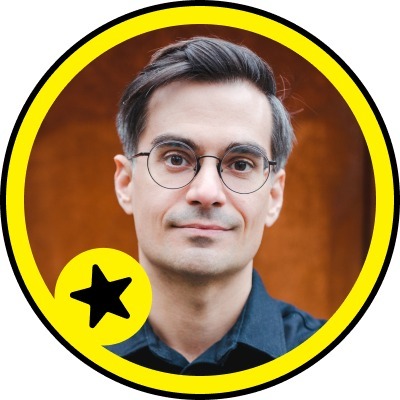Activity
Mon
Wed
Fri
Sun
Jun
Jul
Aug
Sep
Oct
Nov
Dec
Jan
Feb
Mar
Apr
May
What is this?
Less
More
Memberships
Inner Circle Mentorship
Private • 823 • Free
Facilitator Club
Public • 5.7k • Free
752
Private • 7 • Free
Product Synthesis
Public • 88 • Free
13 contributions to Product Synthesis
The first ONCE product from 37signals
You've probably already heard me talking about this, but the first ONCE product from 37signal is available now, it's called Campfire. The idea is that instead of paying for Slack forever, you pay for this once, I really hope more of these types of products take off. https://www.youtube.com/watch?v=GAzRUbE1AAw
5
20
New comment Feb 15

User Research service without users - just AI
I came across this: https://www.syntheticusers.com "Test your idea or product with AI participants and take decisions with confidence." End-to-end AI user research. No scheduling, no interviewing, no synthesising… And NO people. I haven't tried this myself, and I don't want to unfairly dismiss it. But I can't help but think that if this is appealing to you, why not just scrap user research entirely if you can't be bothered to talk to real people, instead of going through the motions of simulating it. I am sure AI can make user research much more efficient and reduce the amount of administrative tasks, help with analysis, scheduling, etc., but I think this is just dumb and a step in the wrong direction.
6
21
New comment Feb 4
1 like • Jan 31
@David Rovira Something I encounter frequently in user interviews is that a user says one thing, but does so in a way that makes you think there's more to their answer, and it's useful to keep asking follow up questions. The idea of replacing users with AI seems like it's just considering user research as a way to validate ideas – when it's a lot more exploratory.
Why people are salty about Product Discovery
You might have spotted a bit of the shade being thrown in Teresa Torres' / Product Discovery's direction on LinkedIn over the last week. I'm not going to wade into those murky waters on LinkedIn (for now), but feels like fair game in our little community! If you're out of the loop - the main criticism is that Product Discovery is too focused on moving fast to reduce risk - instead of more typical UX/CX research where you take time to draw conclusions and discover the truth. It's basically a discussion on the 'depth' of the research. This is a fairly common criticism of Product Discovery as an approach, and unsurprisingly it's usually coming from UX Design & Researcher (who might be more than a little biased). I'm not going to get into the pros and cons of each approach, because it's not a case of which is better and worse. Instead, I'm going to talk about the reason people are salty about Product Discovery - Perceived Value. The perceived value of 'typical' UX research is low. It's seen as time consuming, it doesn't fit comfortably into most product development cycle, and generally the outcomes of research don't give clear direction to the team. When teams are calculating if the time spent is worth the results they'll get, more often than not they'll choose to simply skip UX research to save time. Across my 12 years as a UX Designer this was ALWAYS the challenge when it came to getting research into the process, and it is still a major challenge in design teams today. Product Discovery on the other hand is a response to the perceived value of UX Research. It's leaner, more accessible, more collaborative and has a clear purpose of driving business and product outcomes in a customer centric way. The reason people are salty about Product Discovery taking off is simple, it's because it challenges their notion of what is valuable, and it's being adopted much more quickly than UX research ever was. I say all this as someone who's spun up multiple research labs over the years, done thousands of usability tests, run dozen of Design Sprints, and has always been a strong advocate for more research in Product.
8
19
New comment Feb 10
"Artifact", a much hyped news app by Kevin Systrom, shuts down
https://techcrunch.com/2024/01/18/why-artifact-from-instagrams-founders-failed-shut-down/ "Last week, Artifact, a buzzy news app from Instagram’s co-founders, announced it was shutting down after failing to gain critical mass. The news came as a surprise, as the app was generally well-received by its core audience; smartly leveraged AI to power recommendations, summarize news, and rewrite clickbait; and featured a clean and modern design that made it easy to use. So what went wrong? New data indicates that Artifact couldn’t catch up to the competition and struggled to grow its user base outside the U.S. It also saw downloads of the app steeply dropping off after launch, indicating a failure to catch on with a more mainstream audience." - I heard of Artifact, but didn't have a chance to try it myself. - Some of the features sound interesting, but… - This is my personal bias, but another news reader, no matter how innovative or thoughtfully designed, seems like something nobody *really* wants or needs. - I don't know if and how Artifact's value proposition was validated. But I am assuming it was validated, and yet it still failed to catch on. That can have multiple reasons – some well outside of the product itself. It's possible this could have been a successful product that just failed to find its market. - I could be very wrong, but I have the feeling the time for new consumer apps turning into something everyone is using (like Instagram) is… over.
3
1
New comment Jan 19
InVision is Shutting Down
After selling their Freehand tool to Miro in November last year, InVision have just announced they'll be shutting down at the end of 2024. It's kind of crazy to see how quickly the rise and fall of a company like this can happen. They had a valuable of over $2billion just a few years ago, I remember when you basically couldn't move in the design world without seeing InVision everywhere. It's not surprising, Figma basically took all the utility away from InVision - and even Sketch has it's own prototyping too these days (but who still uses Sketch anyway?) Still, I think InVision played a big role in modernising design collaboration, so it's kind of a shame we won't see anything else from then again. If you wanna read a bit more, you can check out the announcement from the CEO
8
25
New comment Jan 29
2 likes • Jan 5
We used InVision prototyping all the time years ago. Back then it was really slick… but the need to export from the design tool and import to InVision was something I didn't miss at all when we switched to Figma. To be honest, I find it strange that some people even use it at this point. And the 2B valuation… it was a crazy time. We also used Axure! I never got the hang of the more complex interactions but I am quite happy I didn't invest more time into mastering it 😅
2 likes • Jan 5
This announcement reminded me of something I've been thinking about a lot: A big part of my hesitancy to go all-in on new tools is that I doubt they'll be around longer than a few years, leaving my data stranded in some proprietary format. Nobody working on a new product wants to think about the end, but there should be a playbook on letting products die / shut down gracefully, without pissing customers off.
1-10 of 13
@tim-hofer
I am part of the AJ&Smart team! 💛 I am interested in workshop design, and how to solve problems for businesses and people in high value workshops!
Active 3d ago
Joined Nov 27, 2023
Berlin, Germany
powered by



